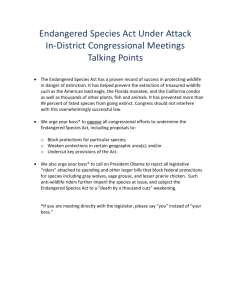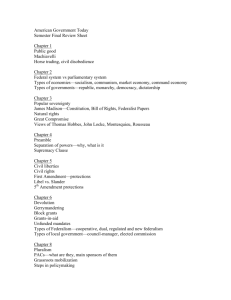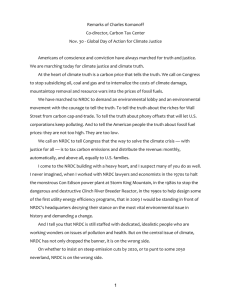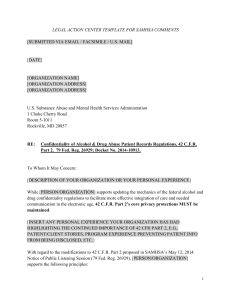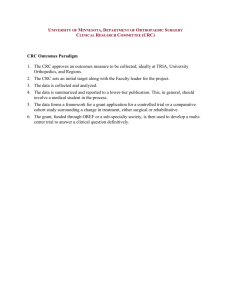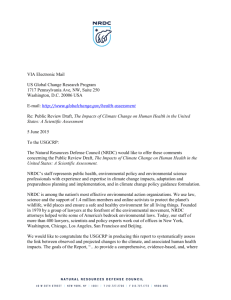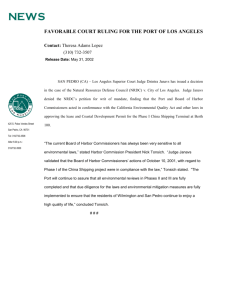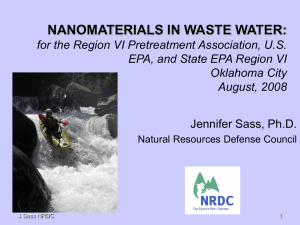Anti-Environmental Activist Judges Threaten Our Air, Water and Land
advertisement
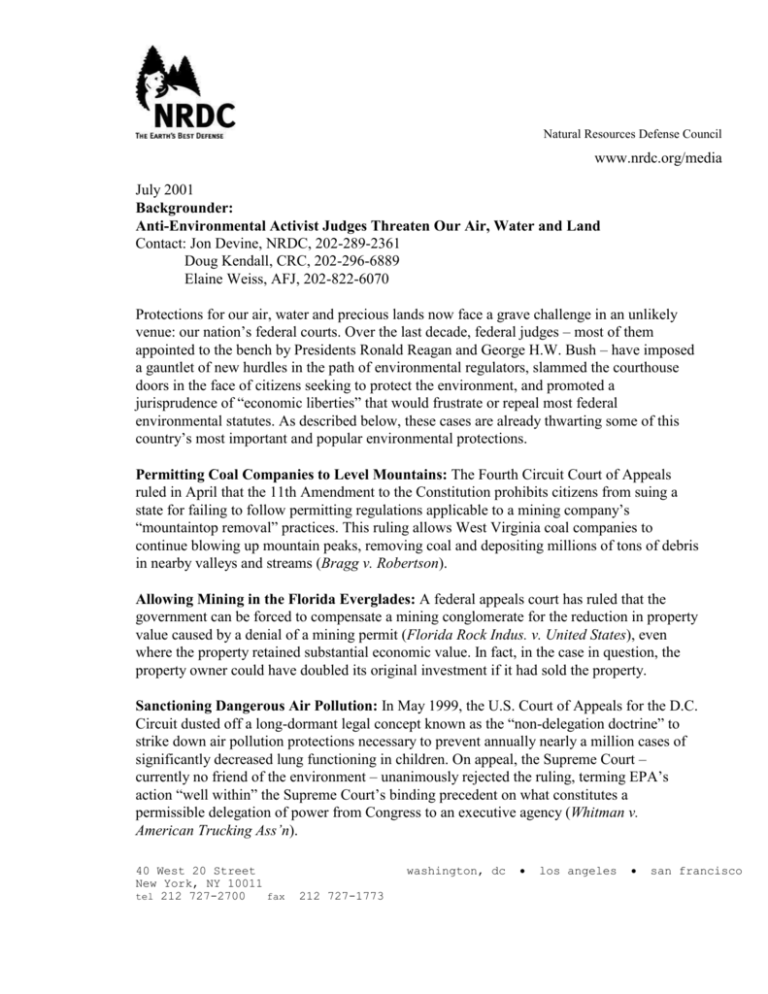
Natural Resources Defense Council www.nrdc.org/media July 2001 Backgrounder: Anti-Environmental Activist Judges Threaten Our Air, Water and Land Contact: Jon Devine, NRDC, 202-289-2361 Doug Kendall, CRC, 202-296-6889 Elaine Weiss, AFJ, 202-822-6070 Protections for our air, water and precious lands now face a grave challenge in an unlikely venue: our nation’s federal courts. Over the last decade, federal judges – most of them appointed to the bench by Presidents Ronald Reagan and George H.W. Bush – have imposed a gauntlet of new hurdles in the path of environmental regulators, slammed the courthouse doors in the face of citizens seeking to protect the environment, and promoted a jurisprudence of “economic liberties” that would frustrate or repeal most federal environmental statutes. As described below, these cases are already thwarting some of this country’s most important and popular environmental protections. Permitting Coal Companies to Level Mountains: The Fourth Circuit Court of Appeals ruled in April that the 11th Amendment to the Constitution prohibits citizens from suing a state for failing to follow permitting regulations applicable to a mining company’s “mountaintop removal” practices. This ruling allows West Virginia coal companies to continue blowing up mountain peaks, removing coal and depositing millions of tons of debris in nearby valleys and streams (Bragg v. Robertson). Allowing Mining in the Florida Everglades: A federal appeals court has ruled that the government can be forced to compensate a mining conglomerate for the reduction in property value caused by a denial of a mining permit (Florida Rock Indus. v. United States), even where the property retained substantial economic value. In fact, in the case in question, the property owner could have doubled its original investment if it had sold the property. Sanctioning Dangerous Air Pollution: In May 1999, the U.S. Court of Appeals for the D.C. Circuit dusted off a long-dormant legal concept known as the “non-delegation doctrine” to strike down air pollution protections necessary to prevent annually nearly a million cases of significantly decreased lung functioning in children. On appeal, the Supreme Court – currently no friend of the environment – unanimously rejected the ruling, terming EPA’s action “well within” the Supreme Court’s binding precedent on what constitutes a permissible delegation of power from Congress to an executive agency (Whitman v. American Trucking Ass’n). 40 West 20 Street New York, NY 10011 tel 212 727-2700 fax washington, dc 212 727-1773 los angeles san francisco Natural Resources Defense Council www.nrdc.org/media Shielding Toxic Polluters: Notwithstanding a nationwide trade in toxic waste and the significant impact that improper disposal of chemicals may have on the economy, a district court in Alabama ruled that the Superfund cleanup law was unconstitutional under the Commerce Clause (United States v. Olin Corp.). Endorsing “Dumb Growth” in Fragile Ecosystems: The Supreme Court has attacked both state and federal attempts to protect sensitive ecosystems, ruling that a South Carolina’s protections for barrier islands was a taking that required compensation to the landowner (Lucas v. South Carolina Coastal Council) and, this term, invalidating federal Clean Water Act protections for millions of acres of waters and wetlands that serve as habitat for migratory birds (Solid Waste Agency of Northern Cook County (SWANCC) v. U.S. Army Corps of Engineers). Threatening Fragile Wildlife: Anti-environmental activist judges have attacked a number of protections for important animal species: The Supreme Court has told environmentalists concerned about endangered species overseas that they lacked standing to complain about threats to the species’ habitat (Lujan v. Defenders of Wildlife). Judges on lower federal courts have required the public to pay a landowner not to harm wildlife by characterizing protections for endangered species as a “taking” of private property for public use (Tulare Lake Basin Water Dist. v. United States) and invalidated regulations that would prohibit habitat modifications resulting in an endangered or threatened species’ death (Sweet Home v. Babbitt). Other judges have argued that preserving species for their potential future medicinal benefits is absurd (National Ass’n of Home Builders v. Babbitt, dissent), and claimed that federal protections for endangered red wolves in North Carolina and Tennessee could not be justified under the Commerce Clause, ignoring evidence that the wolf recovery could result in more than $354 million in additional tourism in one park alone (Gibbs v. Babbitt, dissent). Destroying Wilderness: A district court judge ruled that a federal restriction on big, gasolinepowered motor boats on a lake in a wilderness area amounted to a taking of private property, even though the regulation did not even bar all types of motorboats (Stupak-Thrall v. Glickman). 40 West 20 Street New York, NY 10011 tel 212 727-2700 fax washington, dc 212 727-1773 los angeles san francisco Natural Resources Defense Council www.nrdc.org/media The Natural Resources Defense Council is a national, non-profit organization of scientists, lawyers and environmental specialists dedicated to protecting public health and the environment. Founded in 1970, NRDC has more than 500,000 members nationwide, served from offices in New York, Washington, Los Angeles and San Francisco. More information is available through NRDC’s Web site at www.nrdc.org. CRC is a public interest law firm based in Washington, D.C. that defends laws that make our communities healthier, more livable, and socially just. CRC has helped local governments around the country successfully defend land use and environmental laws that promote public health, combat suburban sprawl, and protect fragile ecosystems, historic structures, and open space. CRC also exposes and critiques anti-environmental judicial activism and the judicial lobbying by special interests that promotes this activism. For more information on CRC, go to www.communityrights.org. The Alliance for Justice is a national association of nearly sixty public interest organizations that advocate for civil rights, social justice, consumer, and environmental protection. Since 1979, the Alliance has worked with and on behalf of its members to safeguard the fairness of our public policy and judicial systems and to strengthen the progressive community’s role in public debates. It helps to ensure that the concerns of ordinary Americans, and the voice of the public interest, receive a fair hearing in the nation’s legislatures and courts of law. To advance that purpose, the Alliance works to: preserve fairness in the courts, strengthen public policy advocacy and train a new generation of public interest activists. For more information regarding the Alliance for Justice, visit www.afj.org. 40 West 20 Street New York, NY 10011 tel 212 727-2700 fax washington, dc 212 727-1773 los angeles san francisco
